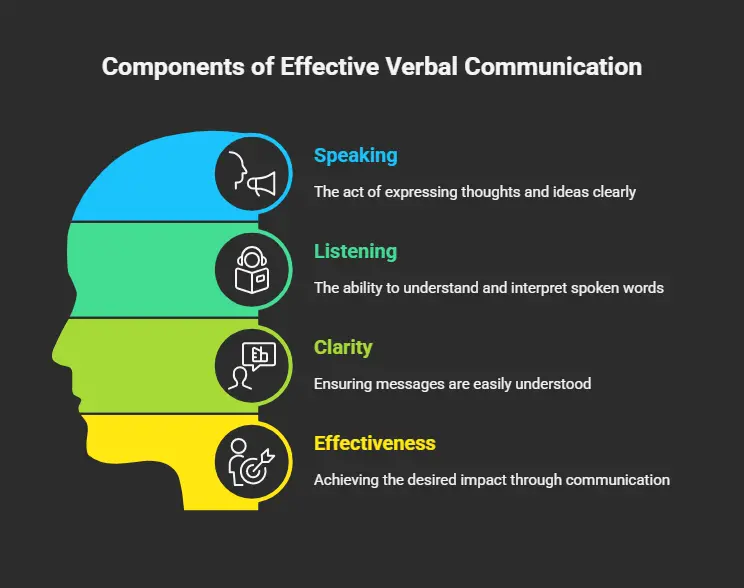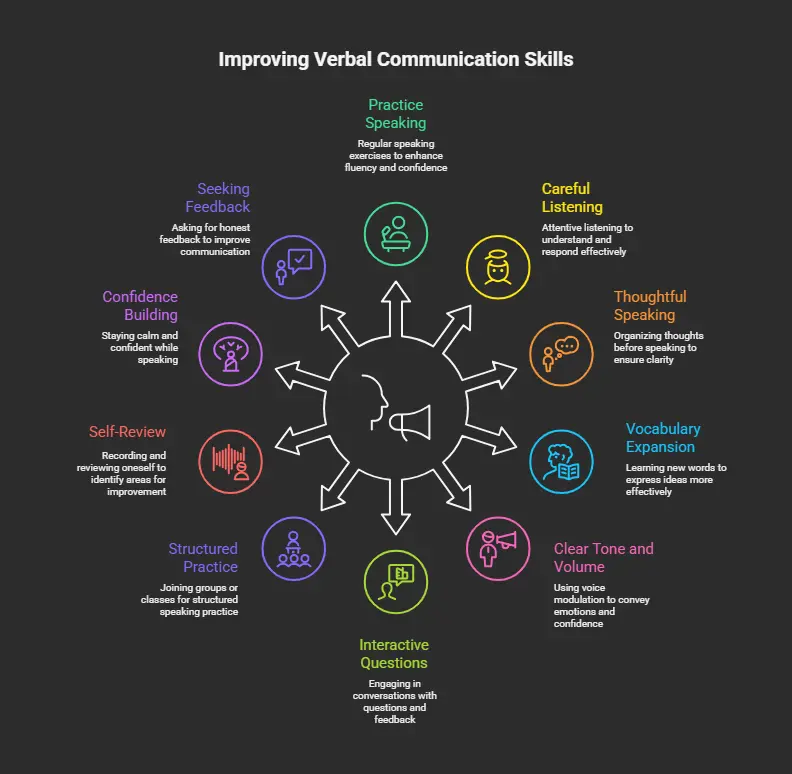Table of Contents
Verbal communication is the way we share thoughts, ideas, and feelings through spoken words. It’s one of the most important skills we use every day—at work, in school, and in our personal lives. Whether you’re talking to a friend, a coworker, or a customer, speaking clearly and confidently helps you build strong connections and avoid misunderstandings.
In this blog, we’ll explain what verbal communication skills are, share simple examples, and give you easy tips to improve them. Whether you’re preparing for a job, an interview, or just want to speak better in daily life, this guide will help you grow.
Begin Your Personality Transformation- Enroll Today!
What are Verbal Communication Skills?
Verbal communication skills are the ability to use words clearly and effectively to share ideas, thoughts, or feelings with others. It includes both speaking and listening. Good verbal communication helps us understand others better and also makes sure they understand what we are saying.
1. Speaking Clearly
This means using the right words and speaking in a way that is easy to understand. It also means speaking at the right speed and tone — not too fast, not too slow, and not too loud or too soft.
Example:
If you’re explaining something to a friend, use simple words and short sentences. Make sure your message is clear so they don’t get confused.
2. Active Listening
Good communication is not just about speaking — it’s also about listening. Active listening means paying full attention when someone else is talking. You don’t interrupt, and you try to understand their point of view.
Example:
When your teacher or boss is giving instructions, you listen carefully, maybe nod to show you understand, and ask questions if needed.
3. Choosing the Right Words
Using polite, respectful, and appropriate language is very important. Your words should match the situation. You wouldn’t speak to a child and your manager the same way.
Example:
You might say “Hey!” to a friend but “Good morning!” to a senior officer.
4. Tone of Voice
The way you say something matters just as much as the words. Your tone can show whether you’re happy, angry, excited, or serious.
Example:
Saying “I’m fine” in a calm tone shows you’re okay, but if you say it in a sharp or angry tone, it could mean you’re upset.
5. Confidence
Speaking with confidence helps people trust what you’re saying. This doesn’t mean being loud or bossy — it means speaking with belief in your words.
Example:
In a job interview, answering questions clearly and with confidence gives a good impression.
Examples of Verbal Communication Skills
🔹 1. Public Speaking
What it means: Speaking in front of a group of people, like in a classroom, meeting, or seminar.
Example: A student giving a presentation on a science project or a team leader explaining project plans during a meeting.
Why it matters: It helps build confidence, share ideas clearly, and influence others positively.
🔹Casual Conversations
What it means: Everyday talk with friends, family, or colleagues.
Example: Talking with a friend about weekend plans or chatting with a coworker during a lunch break.
Why it matters: Builds social bonds and makes relationships stronger. It also helps practice speaking and listening naturally.
🔹Giving Clear Instructions
What it means: Telling someone how to do something in a way that’s easy to understand.
Example: A teacher explaining how to do a math problem or a manager telling a team member how to complete a task.
Why it matters: Good instructions avoid confusion and help people complete tasks correctly and on time.
🔹Participating in Discussions or Meetings
What it means: Sharing your ideas, asking questions, or responding during group talks.
Example: Sharing your opinion in a team meeting or asking a question during a class discussion.
Why it matters: Shows you are engaged and helps in solving problems or making decisions as a group.
🔹Storytelling
What it means: Telling a story or experience in an interesting and meaningful way.
Example: A grandparent sharing a story from their childhood or a teacher using a story to explain a lesson.
Why it matters: Makes communication engaging and helps people connect emotionally with the message.
🔹Giving Feedback
What it means: Telling someone how they did something — what was good and what can be improved.
Example: A manager telling an employee their report was well-written but needs better formatting.
Why it matters: Helps others grow, learn, and perform better.
🔹Active Listening and Responding
What it means: Listening carefully and replying in a thoughtful way.
Example: When a friend talks about a problem, you listen without interrupting and respond with helpful advice.
Why it matters: Shows respect, builds trust, and reduces misunderstandings.
🔹Phone and Video Calls
What it means: Communicating clearly through your voice without face-to-face contact.
Example: Talking to a customer over the phone or attending an online class via Zoom.
Why it matters: It’s important to speak clearly and listen carefully when body language is not visible.
🔹Answering Questions
What it means: Giving clear and correct answers when someone asks you something.
Example: Responding to interview questions or explaining a topic during an exam.
Why it matters: Helps people understand your knowledge and builds your credibility.
🔹Apologizing or Expressing Gratitude
What it means: Using kind and respectful words to say sorry or thank you.
Example: Saying “I’m sorry for the mistake” or “Thank you for your help.”
Why it matters: Builds good relationships and shows emotional intelligence.
Begin Your Personality Transformation- Enroll Today!
How to improve your Verbal Communication Skills
Verbal communication is how we use spoken words to share our thoughts, feelings, and ideas with others. If you want people to understand you better and respond positively, it’s important to improve the way you talk and listen. Here are some easy and effective ways to improve your verbal communication skills:
1. Practice Speaking Every Day
Like any skill, speaking improves with regular practice.
-
Talk to your family, friends, or coworkers more often.
-
Read a short article out loud every day to improve fluency.
-
Try explaining your thoughts clearly — for example, describe your day or narrate a story.
Why it helps: Regular practice helps you become more confident and reduces hesitation.
2. Listen More Carefully
Good speakers are also good listeners. When you listen properly, you can respond better.
-
Pay full attention when someone is speaking.
-
Don’t interrupt. Let the person finish.
-
Show you’re listening by nodding, maintaining eye contact, or saying simple responses like “I understand” or “That makes sense.”
Why it helps: Listening shows respect and helps you understand the other person’s point of view.
3. Think Before You Speak
Before saying something, take a moment to organize your thoughts.
-
Ask yourself: What do I want to say? Is it clear and easy to understand?
-
Avoid speaking too quickly or using difficult words.
Why it helps: Thinking first helps you speak clearly and avoid confusion or misunderstandings.
4. Improve Your Vocabulary
The more words you know, the easier it is to express your thoughts.
-
Learn new words and their meanings every day.
-
Use those words in your conversations naturally.
-
Read books, watch informative videos, or listen to podcasts to pick up new ways of speaking.
Why it helps: A strong vocabulary makes your communication more effective and meaningful.
5. Use a Clear Tone and Volume
Your voice tells people how you feel — happy, angry, confident, or nervous.
-
Speak at a normal pace — not too fast, not too slow.
-
Adjust your volume depending on the situation (don’t whisper or shout).
-
Use a friendly and polite tone.
Why it helps: People respond better when your voice is clear, warm, and confident.
6. Ask Questions and Give Feedback
Asking questions keeps the conversation going and shows you are interested.
-
If you don’t understand something, ask politely.
-
Give clear answers when someone asks you a question.
-
Give helpful feedback when needed — kindly and respectfully.
Why it helps: Questions and feedback make conversations more interactive and productive.
7. Join Speaking Groups or Take Classes
If you want structured practice:
-
Join a group like Toastmasters or a public speaking class.
-
Participate in group discussions or debates.
Why it helps: Speaking in front of others boosts your confidence and helps you improve faster.
8. Record and Review Yourself
Use your phone to record your voice or practice sessions.
-
Listen to how you sound.
-
Notice if you speak too fast, pause too much, or use filler words like “um” or “like.”
-
Try to improve those areas.
Why it helps: You can hear yourself like others do, and work on sounding more natural and confident.
9. Stay Confident and Calm
Many people get nervous while speaking, especially in front of others.
-
Take a deep breath before speaking.
-
Remind yourself that it’s okay to make mistakes.
-
Smile and maintain eye contact.
Why it helps: Staying calm helps your voice sound confident and helps you focus on what you want to say.
10. Get Feedback from Others
Ask someone you trust — a friend, teacher, or coworker — to listen to you and give honest suggestions.
-
Ask what you’re doing well and what needs improvement.
-
Be open to their advice.
Why it helps: Feedback gives you a clear idea of your strengths and areas to work on.
Verbal Communication Skills in the Workplace
Verbal communication skills are very important in the workplace. They help employees share ideas, give updates, ask questions, and solve problems by talking clearly and respectfully with each other.
Here’s how these skills are used in a work setting:
1. Speaking Clearly in Meetings
In meetings, you need to explain your ideas in a simple and clear way.
You should speak with confidence and make sure everyone understands what you are saying.
Example: Sharing your progress on a project during a team meeting.
2. Listening to Others
Listening carefully to coworkers, managers, or clients helps you understand instructions or feedback.
You should avoid interrupting and wait for your turn to speak.
Example: Listening to your manager’s instructions before starting a task.
3. Asking Questions
If something is not clear, it’s important to ask questions politely.
This shows you care about doing the job correctly.
Example: Asking, “Can you please explain the deadline again?” if you’re unsure.
4. Giving and Receiving Feedback
You may need to give feedback to coworkers or receive it from your boss.
Use kind and helpful words when giving feedback, and accept feedback with a positive attitude.
Example: Saying, “Your report looks great. Maybe you can add more details to the last section.”
5. Handling Conflicts Calmly
Sometimes, there are misunderstandings or disagreements.
Using polite and calm words helps solve problems without creating tension.
Example: “I understand your point. Can we find a solution that works for both of us?”
6. Talking to Clients or Customers
When talking to clients, be polite, clear, and helpful.
Your words should make them feel respected and valued.
Example: “Thank you for calling. I’ll be happy to assist you.”
How to Highlight Verbal Communication Skills
Verbal communication skills are highly valued in schools, jobs, and daily life. If you are good at speaking and listening, it’s important to show these skills clearly — whether you’re writing a resume, giving an interview, or talking to others at work.
✅On Your Resume or CV
You can mention your verbal communication skills under the “Skills” section or explain them through your past experiences in the “Work Experience” section.
Example:
-
“Strong verbal communication skills – experienced in leading team meetings and explaining project updates clearly.”
-
“Handled customer calls and resolved issues by communicating in a calm and professional manner.”
Use action words like:
presented, explained, led discussions, answered, guided, responded, negotiated.
✅In a Job Interview
An interview is a perfect place to show your verbal skills, not just talk about them.
-
Speak clearly and confidently.
-
Listen carefully to the questions and answer with complete sentences.
-
Maintain good eye contact, use a polite tone, and avoid filler words like “um” or “like.”
Tip: Use examples to describe situations where you used verbal communication well.
Example Answer:
“In my last job, I regularly explained project goals to team members and helped new employees by clearly guiding them through their tasks.”
✅In the Workplace
Show your communication skills by how you speak with your coworkers, managers, and clients.
-
Be polite and respectful.
-
Ask questions when needed and listen carefully.
-
Lead discussions, share updates in meetings, or give feedback in a positive way.
Example: If you give a good presentation or solve a customer issue by talking calmly, people will notice your strong communication abilities.
✅In School or College
Students can highlight verbal communication by:
-
Participating in classroom discussions.
-
Giving presentations or leading group projects.
-
Speaking at events or helping classmates understand topics.
Begin Your Personality Transformation- Enroll Today!
Conclusion
Verbal communication skills play a big role in how we connect with others—at work, school, and in daily life. Being able to speak clearly, listen carefully, and respond respectfully helps build trust and avoid misunderstandings. Whether you’re leading a meeting, having a casual chat, or solving a problem, strong verbal communication makes a big difference. The good news is that these skills can be improved with regular practice, active listening, and a positive attitude. By focusing on real-life examples and working on simple habits, anyone can become a better communicator and build stronger relationships.
| Related Links | |
| Top Communication Skills For A Resume | What Does a Group Leader Do? |
Boost Your Skills & Kickstart Your Career!
Employability and Personality Development Course by Entri App: Enhance your communication, confidence, and job-ready skills to excel in your career.
Join Now!Frequently Asked Questions
What are verbal communication skills?
Verbal communication skills are the ability to share your thoughts, ideas, and feelings using spoken words. This includes speaking clearly, listening actively, using the right tone, and choosing the right words. Good verbal communication helps others understand you and builds better relationships both at work and in daily life.
Why are verbal communication skills important in the workplace?
Verbal communication is important in the workplace because it helps teams work better together. Employees need to explain ideas, give updates, ask questions, and solve problems using clear speech. Good communication reduces mistakes, improves teamwork, and helps build trust between coworkers, managers, and clients.
What are some real-life examples of verbal communication?
Some real-life examples include giving a presentation at work, answering a customer’s question, explaining a task to a colleague, participating in a class discussion, or even having a friendly conversation with someone. In each case, how you speak and listen matters.
How can I improve my verbal communication skills if I’m shy or nervous?
If you’re shy or nervous, start by practicing in a safe environment like talking in front of a mirror or with close friends. Speak slowly and clearly. Join speaking groups or take part in small discussions. Over time, your confidence will grow. Remember, making mistakes is okay — the key is to keep trying and learning.
How do I highlight verbal communication skills in my resume or job interview?
In your resume, mention specific situations where you used verbal communication, such as giving presentations, training others, or speaking with clients. In interviews, show your skills by speaking clearly, listening carefully, and giving examples from your past experiences. How you communicate in the interview itself also reflects your ability.
Can verbal communication skills be learned and improved?
Yes, absolutely! Verbal communication is a skill that can be developed with time and practice. You can improve by reading aloud, joining conversations, watching how good speakers talk, expanding your vocabulary, and getting feedback from others. The more you practice, the better you’ll become.













